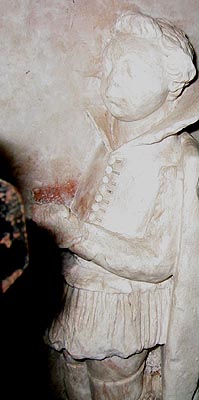 |
 |
|||
|
|
Edmund was the son of Sir William Dunch of Little Wittenham (Berkshire) and his wife, Mary the daughter of Sir Henry Cromwell. He was the great grandson of the first William Dunch to settle in Berkshire. Edmund was High Sheriff of Berkshire in 1634; MP for Wallingford in the Parliaments of 1628 and 1640, and for his home county in the Parliament of 1653. His return to the long Parliament was declared void. He had, of course, joined the parliamentary party, signing the Protestation in 1641, taking the covenant in 1647, being appointed to the committee for levying fines on the estates of delinquents and, in 1648, joining the protestors against any agreement with the King. He is said to have been made Governor of Wallingford Castle, by his cousin, the Lord Protector, Oliver Cromwell, in 1655. Three years later, he was created a baronet and, when Cromwell proposed to reconstitute the House of Lords in the same year, he was called to the Upper House with the title of Baron Burnell of East Wittenham through the right of his wife. This lady was Bridget, the daughter and £60,000 heiress of Sir Anthony Hungerford of Down Ampney in Gloucestershire (a descendant of Edmund Hungerford and Margaret, the grandaughter and co-heiress of Hugh, Lord Burnell). Together, they had three sons and two daughters. Edmund was divested of his title at the Restoration, but still managed to keep his high position in the region of Wittenham, being made Sheriff of Oxfordshire in 1668. Speaking of this gentleman, the author of a pamphlet entitled "The Mysteries of the Good Old Cause" published in 1660, says, "he was the husband of the fine Mrs. Dunch; was a great favourite with the Protector, and had a patent to be lord of the Lord knows what, and how little he deserves it." Edmund died in early August 1678 and was buried in Little Wittenham Church, being succeeded in his estates by his eldest son, Hungerford, and, subsequently, by his grandson and namesake. Edited from Walter Money's 'The Dunch Family of Little Wittenham'
|
|||
| © Nash Ford Publishing 2001. All Rights Reserved. | ||||



 Edmund Dunch (1603-1678)
Edmund Dunch (1603-1678)